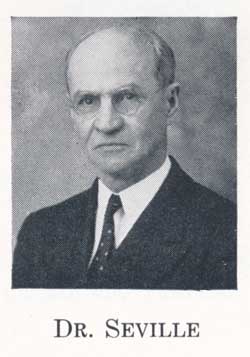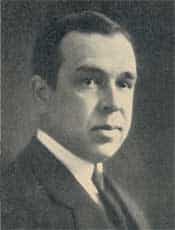Rev. George H. Seville
George H. Seville was born on March 19, in 1876, near the town of Bellevue, Pennsylvania. He later graduated from the Shadyside Academy in Pittsburgh, from Westminster College, New Wilmington, PA, and lastly from Allegheny Seminary (UPCNA), Pittsburgh. He served as a high school teacher for a brief time before taking additional studies at the Moody Bible Institute, in preparation for ministry in China, with his term overseas beginning in 1902, serving under the auspices of the China Inland Mission. While stationed there, he met and later married a fellow missionary, the former Jessie Maud Merritt Greene, in 1905. [Mrs. Seville was born on October 15, 1874, and she died on January 2, 1960 in Wilmington, Delaware.]The couple had four children, all born in China. Three daughters, Janet (Mrs. Ralph M. Bragdon), Elsa (Mrs. Roger B. VanBuskirk) and Edith (Mrs. Francis A. Schaeffer), and a son, John, who died in infancy.
The Seville family returned from China in 1919, whereupon Rev. Seville studied at Gordon College and then served as pastor of the Westminster Presbyterian church, Newburgh, NY, from 1923-1930. From 1931-1935, Rev. Seville served in the publishing department of the China Inland Mission, based initially in Toronto, Ontario and later in Philadelphia, PA. It was during this period that his alma mater Westminster College awarded him the Doctor of Divinity degree, in 1932. He was next one of the founding professors at the Faith Theological Seminary, teaching Greek and Practical Theology. As he retired from that service in 1955, this was also about the same time that Francis and Edith Schaeffer founded the L’Abri ministry, and Dr. Seville served as treasurer for the L’Abri ministry from 1955 to 1967. Dr. Seville lived another ten years, reaching the age of 101, and died on March 21, 1977.
The bulk of Dr. Seville’s published writing, so far as I’ve been able to discover, appeared on the pages of The Bible Today, a publication of The National Bible Institute in New York City. These articles appeared during the years when Dr. J. Oliver Buswell, Jr. was serving as president of that school. The PCA Historical Center has a complete run of this periodical from May 1941 to September 1951, and is currently searching for issues prior to May 1941. Dr. Seville appears to have written largely on the subject of Christian biography, though with some exceptions, one of which follows:
Minced Oaths
by Rev. George H. Seville, D.D.
A visiting minister was asked to lead in prayer in Sunday school, and when he had finished, a teacher heard one of her girls whisper, “Gosh, what a prayer!” Such an exclamation seems incongruous in expressing one’s appreciation of a prayer, but a little thought will lead anyone to the conclusion that “gosh” is not an appropriate word for a Christian to use on any occasion whatsoever. When we look into the original meaning of such interjections, we may be surprised that even some Christian people are habitual users of expressions which the dictionary terms “minced oaths.”
A very commonly used interjection is “Gee.” It is capitalized in Webster’s New International Dictionary and given this definition: “A form of Jesus, used in minced oaths.” This derivation is even more apparent when the form “Geez,” now frequently heard, is used. Two other common words and their definitions are these: “Golly—a euphemism for God, used in minced oaths; gosh, a substitute for God, used in minced oaths.” “Darn, darned, darnation” are said to be “colloquial euphemisms for damn, damned, damnation.” Persons who allow their lips to utter “Gosh- darned” quite freely would be shocked if they realized the real meaning of the word.
A certain minister, professor in a sound seminary, when he was a child was not allowed to use “goodness,” “mercy,” or “gracious” as exclamations. He was inclined to think the restrictions a family peculiarity, merely a parental overcarefulness, but now he can see that it had a sound Calvinistic basis. The Shorter Catechism asks, “What is required in the third commandment?” and then gives this answer: “The third commandment requireth the holy and reverent use of God’s names, titles, attributes, ordinances, words, and works.” Certainly goodness is an attribute of God. That this is so is recognized by Webster in the latter part of his definition: “The word is used colloquially as an exclamation, or in various exclamatory phrases, as “for goodness sake! goodness gracious 1”—the reference being originally to the goodness of God.”
The use of minced oaths is quite contrary to the spirit of the New Testament teaching. For example, our Lord Jesus said: “But I say unto you, Swear not at all. . . . But let your speech be, Yea, yea; Nay, nay: and whatsoever is more than these is of the evil one” (Matt. 5:34, 37, R. V.). The phrase “whatsoever is more than these” suggests the meaning of expletives, or exclamations: an expletive is defined as “something added merely as a filling; especially a word, letter, or syllable not necessary to the sense, but inserted to fill a vacancy.”
James in writing his Epistle repeats almost exactly the words of the Lord Jesus quoted above: “But above all things, my brethren, swear not, neither by the heaven, nor by the earth, nor by any other oath: but let your yea be yea, and your nay, nay; that ye fall not under judgment” (Jas. 5:12). That last word recalls our Lord’s declaration: “But I say unto you, That every idle word that men shall speak, they shall give account thereof in the day of judgment” (Matt. 12:36). The result of this judgment is given in the following verse, “For by thy words thou shalt be justified, and by thy words thou shalt be condemned.”
If we try to excuse ourselves by saying that these exclamations slip through our lips unawares, we need to heed the Holy Spirit’s warning in the Epistle of James: “If any man thinketh himself to be religious, while he bridleth [or, curbeth] not his tongue, but deceiveth his heart, this man’s religion is vain” (1:26). Even though we do not intend these minced oaths to bear the meaning the words originally had, we certainly cannot truthfully say that the use of them accords with Christ’s command, “Let your speech be, Yea, yea; Nay, nay.”
James seemed puzzled by the same anomaly that puzzles us, namely, the presence of minced oaths on the lips of Christians. Writing of the tongue as “a restless evil . . . full of deadly poison,” he said: “Therewith bless we the Lord and Father; and therewith curse we men, who are made after the likeness of God: out of the same mouth cometh forth blessing and cursing. My brethren, these things ought not so to be” (Jas. 3 : 8-10).
While no attempt has been made to give a complete list of all the words in the vocabulary of near-profanity, enough has been said to indicate that present- day speech has fallen below that standard which Christ Jesus set for his disciples.
The tendency in the use of expletives is to find the milder ones becoming less expressive of our feelings, to discard them, and use stronger ones in their stead. A careless following of others in the use of these common minced oaths will dull our own spiritual sensitiveness, and will weaken our Christian testimony.
To gain the victory in this matter of full obedience to our Lord Jesus, we need to make the prayer of David our daily petition: “Let the words of my mouth, and the meditation of my heart, be acceptable in thy sight, O Lord, my strength and my redeemer” (Psalm 19: 14).
Image source : Sixteenth Annual Catalog of Faith Theological Seminary, Elkins Park, PA, Summer 1953, page 7.




